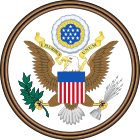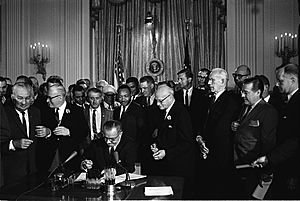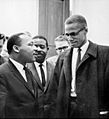Civil Rights Act of 1964 facts for kids
 |
|
| Long title | An act to enforce the constitutional right to vote, to confer jurisdiction upon the district courts of the United States of America to provide injunctive relief against discrimination in public accommodations, to authorize the Attorney General to institute suits to protect constitutional rights in public facilities and public education, to extend the Commission on Civil Rights, to prevent discrimination in federally assisted programs, to establish a Commission on Equal Employment Opportunity, and for other purposes. |
|---|---|
| Enacted by | the 88th United States Congress |
| Effective | July 2, 1964 |
| Citations | |
| Public law | [http://library.clerk.house.gov/reference-files/PPL_CivilRightsAct_1964.pdf 88-352 1981 U.S.C. § 1996b] |
| Statutes at Large | 78 Stat. 241 |
| Codification | |
| Acts amended | Civil Rights Act of 1957 Civil Rights Act of 1960 |
| Titles amended | 42 |
| Legislative history | |
|
|
| Major amendments | |
| Equal Employment Opportunity Act of 1972 Civil Rights Act of 1991 No Child Left Behind Act Lilly Ledbetter Fair Pay Act of 2009 |
|
| United States Supreme Court cases | |
| Heart of Atlanta Motel, Inc. v. United States (1964) Katzenbach v. McClung (1964) Alexander v. Holmes County Board of Education (1969) Griggs v. Duke Power Co. (1971) Ricci v. DeStefano (2009) |
|
The Civil Rights Act of 1964 was a very important law in the United States. It made it illegal to treat people unfairly because of their race, skin color, religion, gender, or where they came from. This law stopped racial segregation (keeping people separate) in many places. This included schools, jobs, and public places like hotels and restaurants. It also made sure everyone had an equal chance to vote.
Contents
Why the Law Was Needed
Before 1964, many parts of the United States had laws that allowed or even required segregation. This meant Black people and other minority groups were often treated as second-class citizens. They couldn't go to the same schools, use the same restrooms, or eat in the same restaurants as white people. This unfair treatment was a big problem.
President Kennedy's Call for Change
In 1963, President John F. Kennedy saw how serious the problem of discrimination was. He gave a famous speech on June 11, 1963. In this speech, he asked Congress to pass a new law. He wanted a law that would give all Americans the right to be served in any public place. He also wanted to make sure everyone had stronger protection for their right to vote. Kennedy felt it was time for the country to truly live up to its promise of equality for all.
President Johnson Continues the Fight
President Kennedy was sadly assassinated on November 22, 1963. His death changed the political situation. The new president, Lyndon B. Johnson, had a lot of experience working with Congress. He used his power as president to push for the civil rights bill. In his first speech to Congress after Kennedy's death, Johnson said that passing the civil rights bill would be the best way to honor President Kennedy's memory. Johnson worked hard to get enough votes to pass this important law.
Images for kids
-
United States President John F. Kennedy addresses the nation on civil rights on June 11, 1963
-
Martin Luther King Jr. and Malcolm X at the United States Capitol on March 26, 1964, listening to the Senate debate on the bill. The two met for only one minute.
-
A page from an informal record of the roll call vote kept by the House Clerk on first passage of the bill by the House. Note that this document does not accurately reflect the final vote tally. For example, it erroneously records Minnesota Congressman John Blatnik as a no vote, when he in fact voted in favor of H.R. 7152.
See also
 In Spanish: Ley de Derechos Civiles de 1964 para niños
In Spanish: Ley de Derechos Civiles de 1964 para niños







